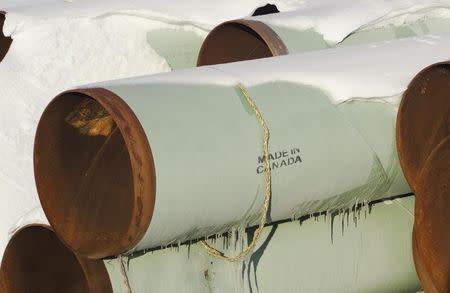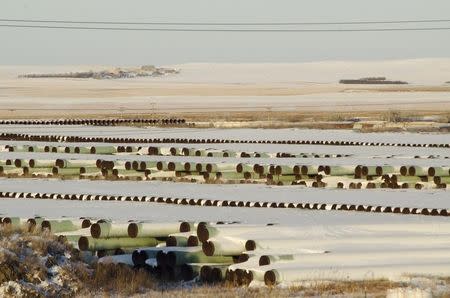TransCanada sues U.S. over Keystone XL rejection, seeks damages
By Nia Williams and Roberta Rampton CALGARY/WASHINGTON, Alberta (Reuters) - TransCanada Corp sued the U.S government on Wednesday to reverse President Barack Obama's rejection of the Keystone XL pipeline, calling his decision unconstitutional. TransCanada also sought $15 billion in a separate action under the North American Free Trade Agreement (NAFTA), saying the pipeline permit denial was "arbitrary and unjustified." The company's lawsuit in federal court in Houston does not seek legal damages but wants the permit denial invalidated and seeks a ruling that no future president can block construction. Obama rejected the cross-border crude oil pipeline last November, seven years after it was first proposed, saying it would not make a meaningful long-term contribution to the U.S. economy. The Keystone XL was designed to link existing pipeline networks in Canada and the United States to bring crude from Alberta and North Dakota to refineries in Illinois and, eventually, the Gulf of Mexico coast. In filing the NAFTA claim, TransCanada said it "had every reason to expect its application would be granted" as it had met the same criteria the U.S. State Department used when approving other similar cross-border pipelines. "Presumably they have a case that there are damages, as they were led to believe that if they did these things they'd get it across the line, but they weren't able to," said portfolio manager Ryan Bushell at Leon Frazer & Associates in Toronto, whose firm owns more than a million shares in TransCanada. "I'd imagine that this is more than a PR move and they believe they have a real case." The White House referred requests for comment to the U.S. State Department. The State Department did not immediately respond to requests for comment. In Ottawa, a spokesman for the Canadian foreign ministry said the government "has no role in this dispute." Since October, Canada has been run by Justin Trudeau's Liberals, who backed the pipeline but not as vociferously as the former ruling Conservatives. TransCanada said it will also take an after-tax write down of C$2.5 billion ($1.78 billion) to C$2.9 billion in the fourth quarter after the permit denial. The project ran into opposition from environmental groups in the United States and blocking it became a litmus test of the green movement's ability to hinder fossil fuel extraction in Canada's oil sands. "The suit is a reminder that we shouldn’t be signing new trade agreements like the Trans Pacific Partnership that allow corporations to sue governments that try and keep fossil fuels in the ground," said Jason Kowalski, policy director of environmental group 350.org which opposed the pipeline. TransCanada called the rejection "a symbolic gesture" aimed at burnishing the Obama administration's leadership on climate change in the eyes of the international community. TransCanada is also developing the Energy East pipeline, designed to move 1.1 million barrels per day of western crude to Canada's East Coast. That project too faces opposition from environmentalists trying to halt industry expansion. TransCanada shares closed down 1.6 percent at $31.70 on the New York Stock Exchange on Wednesday. After hours, the stock price stayed steady after the legal actions were announced. ($1 = 1.4075 Canadian dollars) (Additional reporting by Valerie Valcovic in Washington, David Ljunggren in Ottawa, Euan Rocha in Toronto; writing by Amran Abocar; Editing by David Gregorio)




